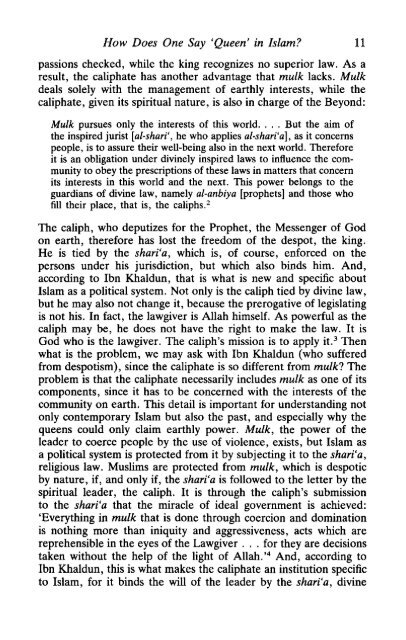Fatima.Mernessi_The-Forgotten-Queens-of-Islam-EN
Fatima.Mernessi_The-Forgotten-Queens-of-Islam-EN
Fatima.Mernessi_The-Forgotten-Queens-of-Islam-EN
You also want an ePaper? Increase the reach of your titles
YUMPU automatically turns print PDFs into web optimized ePapers that Google loves.
How Does One Say 'Queen' in <strong>Islam</strong>? 11<br />
passions checked, while the king recognizes no superior law. As a<br />
result, the caliphate has another advantage that mulk lacks. Mulk<br />
deals solely with the management <strong>of</strong> earthly interests, while the<br />
caliphate, given its spiritual nature, is also in charge <strong>of</strong> the Beyond:<br />
Mulk pursues only the interests <strong>of</strong> this world. . . . But the aim <strong>of</strong><br />
the inspired jurist [al-shari', he who applies al-shari'a], as it concerns<br />
people, is to assure their well-being also in the next world. <strong>The</strong>refore<br />
it is an obligation under divinely inspired laws to influence the community<br />
to obey the prescriptions <strong>of</strong> these laws in matters that concern<br />
its interests in this world and the next. This power belongs to the<br />
guardians <strong>of</strong> divine law, namely al-anbiya [prophets] and those who<br />
fill their place, that is, the caliphs. 2<br />
<strong>The</strong> caliph, who deputizes for the Prophet, the Messenger <strong>of</strong> God<br />
on earth, therefore has lost the freedom <strong>of</strong> the despot, the king.<br />
He is tied by the shari'a, which is, <strong>of</strong> course, enforced on the<br />
persons under his jurisdiction, but which also binds him. And,<br />
according to Ibn Khaldun, that is what is new and specific about<br />
<strong>Islam</strong> as a political system. Not only is the caliph tied by divine law,<br />
but he may also not change it, because the prerogative <strong>of</strong> legislating<br />
is not his. In fact, the lawgiver is Allah himself. As powerful as the<br />
caliph may be, he does not have the right to make the law. It is<br />
God who is the lawgiver. <strong>The</strong> caliph's mission is to apply it. 3 <strong>The</strong>n<br />
what is the problem, we may ask with Ibn Khaldun (who suffered<br />
from despotism), since the caliphate is so different from mulk? <strong>The</strong><br />
problem is that the caliphate necessarily includes mulk as one <strong>of</strong> its<br />
components, since it has to be concerned with the interests <strong>of</strong> the<br />
community on earth. This detail is important for understanding not<br />
only contemporary <strong>Islam</strong> but also the past, and especially why the<br />
queens could only claim earthly power. Mulk, the power <strong>of</strong> the<br />
leader to coerce people by the use <strong>of</strong> violence, exists, but <strong>Islam</strong> as<br />
a political system is protected from it by subjecting it to the shari'a,<br />
religious law. Muslims are protected from mulk, which is despotic<br />
by nature, if, and only if, the shari'a is followed to the letter by the<br />
spiritual leader, the caliph. It is through the caliph's submission<br />
to the shari'a that the miracle <strong>of</strong> ideal government is achieved:<br />
'Everything in mulk that is done through coercion and domination<br />
is nothing more than iniquity and aggressiveness, acts which are<br />
reprehensible in the eyes <strong>of</strong> the Lawgiver ... for they are decisions<br />
taken without the help <strong>of</strong> the light <strong>of</strong> Allah.' 4 And, according to<br />
Ibn Khaldun, this is what makes the caliphate an institution specific<br />
to <strong>Islam</strong>, for it binds the will <strong>of</strong> the leader by the shari'a, divine


